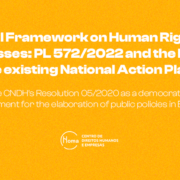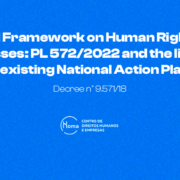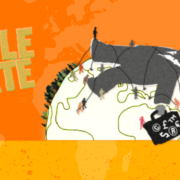France’s Duty of Vigilance Law
Due diligence: a normative reality in the Human Rights and Business Agenda
Author: Ana Laura Figueiredo
In this new blog series, we will address the due diligence concept, incorporated by the UN Guiding Principles, and some regulations, approved or under discussion, which have become references for the study of the subject and seek to transform its application. Throughout the series, we will analyze the French (Loi de vigilance), the European Union (Directive on Corporate Sustainability Due Diligence ), the German Due Diligence (Act on Corporate Due Diligence Obligations in Supply Chains) and, finally, other normative instruments that do not deal exclusively with due diligence, such as the Brazilian Bill 572/2022, that has already been a topic in another series in which we explain the National Agenda and its construction process.
Contextualization
In this post, the focus of analysis will be the French Vigilance Law (Loi de vigilance), also known as Law 399/2017, which was approved on March 23, 2017 after a long period of discussions. The main motivation behind it was the collapse of Rana Plaza in 2013, a building located in Bangladesh that housed several garment factories with production destined for renowned brands, however, at low cost due to poor wages and unhealthy working conditions. The case that became known worldwide, after the death of more than a thousand people, served to strengthen the debate on business activity and the accountability of transnationals in the face of human rights violations, since the norms encouraged by the Guiding Principles reinforce voluntariness and do not bring a paradigm shift in the business and human rights agenda.
Advances and limitations of the “Surveillance Law”
Among the provisions of the law, we have the establishment of due diligence obligations in terms of human rights, which are not limited to the production of reports and dissemination of information. In addition, the law covers the protection of both human rights, and generally the environment, and extends the obligations to third parties involved. To put these obligations into effect, companies have a duty to implement a surveillance plan that affects subsidiary companies, subcontractors and suppliers, expanding the duty of due diligence to the production chain.
Along with this, the law guarantees the monitoring of the mentioned obligations, the sanction of possible violations, and allows surveillance plans to undergo judicial review upon request of any interested party, such as non-governmental organizations.
On the other hand, there are some limits to its application. The first of them is related to the question of extraterritoriality and the forum non conveniens, since the law has its application regulated by the rules of private international law, which means that it will be limited to the French courts.
The second limit is in relation to the criteria for the reach of companies, thus, the law will only be addressed to companies with headquarters in France, which are structured as a corporation, limited partnership by shares or public companies of the European Union and which have either five thousand employees in France or ten thousand around the world.
Finally, the third limit is given by the way in which rights and obligations are arranged, since the idea of mitigating risks is still present as the law only requires companies to avoid human rights violations characterized as serious, the scope of the production chain is limited by the requirement of an established commercial relationship, and there is no provision for the inversion of the burden of proof, a very important rule for an agenda that recognizes the power imbalance between companies and the people affected.
Total Energies Case
In 2006, an oil reserve was discovered on the Albertine River, located within the Murchison Falls National Park in Uganda, an area that was considered a Lion Conservation Unit.
Total, through its subsidiary Total E & P Uganda, has been leading the Tilenga, which aims to extract 200,000 barrels of oil per day through 400 wells with 34 drilling machines, 10 of which are located in the natural reserve areas of the aforementioned park. It is important to mention that Uganda is a landlocked country, which leads to the need to build pipelines to carry out the flow and the involvement of the Japanese company Toyota Tsusho Corporation in this venture.project Tilenga will displace more than 31,000 people, as the pipeline will pass through 178 villages in Uganda and 231 in Tanzania, making the route through the south of the country and avoiding territories with potential insecurities related to terrorism.
In this case, we have the involvement not only of Total Energies, but of subsidiaries and subcontractors Total E&P Uganda, Toyota Tsusho and China National Offshore Oil Corporation (CNOOC Group), in addition to the work of Project Tilenga together with the Project developed by Total East Africa Midstream BV (TEAM), the EACOP (East African Crude Oil Pipeline).
Among the impacts already produced and those foreseen with the continuity of the project, we have the loss of land ownership and tenure of the local residents, the economic disadvantage during the negotiation between residents and companies, the rupture of relations with the territory, and the pollution of the resources used by the inhabitants. Environmental damage is also diverse, such as the release of flammable and toxic gasses, leaks of toxic inputs, destruction of local fauna and flora, and possible explosions. With the advancement of negotiations and the start of operations in the country, it is possible to perceive the non-compliance with domestic laws and international regulations, which generates negative precedents in the country regarding business activity.
In addition to the listed impacts, there was the persecution and arrest of journalists and witnesses who sought to denounce and report human rights violations by the companies, leading to the militarization of the oil zone, since the country’s government is allied with the enterprise.
Backed by the Vigilance Act, the organizations Les Amis de la Terre France, The National Association of Professional Environmentalists (NAPE) and the Africa Institute for Energy Governance brought the case to the French Courts. The main points of the decisions held were the attribution of competence to the Commercial Court, the difficulty of determining violations since the law does not have an exhaustive list of human rights, and the burden of proof that falls on those affected, which definitely makes the procedure difficult. since the population is in a situation of vulnerability. Therefore, it becomes noticeable the difficulty of accomplishing the accountability of companies and the due diligence of human rights and the environment, with gaps still remaining that reveal the importance of approving a Binding Treaty of Business and Human Rights.
In the next post in the series, we will continue the analysis of regulations on due diligence in terms of human rights, focusing on the European Union Directive (Directive on Corporate Sustainability Due Diligence). We will again bring points about the application and its limits, in addition to the case of the gas industry in Cabo Delgado, which has the involvement of several European transnationals and help us to elucidate the themes analyzed.
Glossary
|












Leave a Reply
Want to join the discussion?Feel free to contribute!